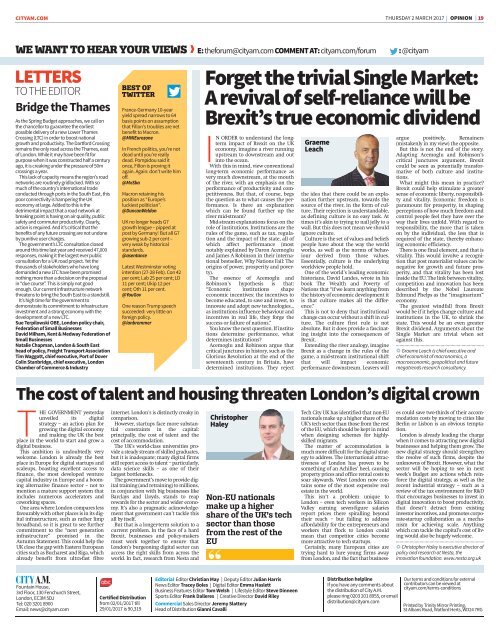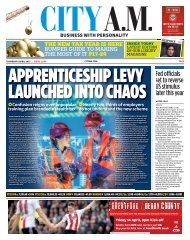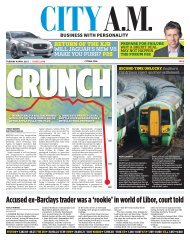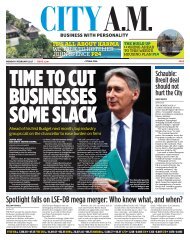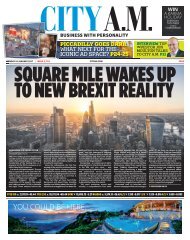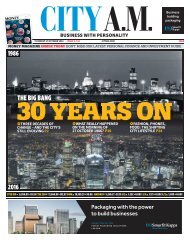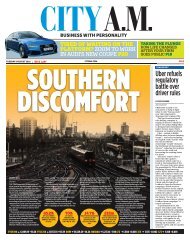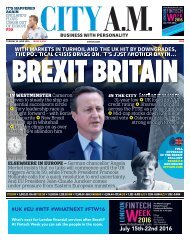IT’S BACK!
cityam-2017-03-02-58b76d1711574
cityam-2017-03-02-58b76d1711574
You also want an ePaper? Increase the reach of your titles
YUMPU automatically turns print PDFs into web optimized ePapers that Google loves.
CITYAM.COM<br />
THURSDAY 2 MARCH 2017<br />
OPINION<br />
19<br />
WE WANT TO HEAR YOUR VIEWS › E:theforum@cityam.com COMMENT AT:cityam.com/forum<br />
LETTERS<br />
TO THE EDITOR<br />
Bridge the Thames<br />
As the Spring Budget approaches, we call on<br />
the chancellor to guarantee the earliest<br />
possible delivery of a new Lower Thames<br />
Crossing (LTC) in order to boost national<br />
growth and productivity. The Dartford Crossing<br />
remains the only road across the Thames, east<br />
of London. While it may have been fit for<br />
purpose when it was constructed half a century<br />
ago, it is creaking under the pressure of 50m<br />
crossings a year.<br />
This lack of capacity means the region’s road<br />
networks are routinely gridlocked. With so<br />
much of the country’s international trade<br />
conducted through ports in the South East, this<br />
poor connectivity is hampering the UK<br />
economy at large. Added to this is the<br />
detrimental impact that a road network at<br />
breaking point is having on air quality, public<br />
safety and commuter productivity. Clearly,<br />
action is required. And it’s critical that the<br />
benefits of any future crossing are not undone<br />
by punitive user charges.<br />
The government’s LTC consultation closed<br />
around this time last year and received 47,000<br />
responses, making it the largest ever public<br />
consultation for a UK road project. Yet the<br />
thousands of stakeholders who have long<br />
demanded a new LTC have been promised<br />
nothing more than a decision on the proposal<br />
in “due course”. This is simply not good<br />
enough. Our current infrastructure network<br />
threatens to bring the South East to a standstill.<br />
It’s high time for the government to<br />
demonstrate its commitment to infrastructure<br />
investment and a strong economy with the<br />
development of a new LTC.<br />
Sue Terpilowski OBE, London policy chair,<br />
Federation of Small Businesses<br />
David Milham, Kent & Medway Federation of<br />
Small Businesses<br />
Natalie Chapman, London & South East<br />
head of policy, Freight Transport Association<br />
Tim Waggott, chief executive, Port of Dover<br />
Colin Stanbridge, chief executive, London<br />
Chamber of Commerce & Industry<br />
THE GOVERNMENT yesterday<br />
unveiled its digital<br />
strategy – an action plan for<br />
growing the digital economy<br />
and making the UK the best<br />
place in the world to start and grow a<br />
digital business.<br />
This ambition is undoubtedly very<br />
welcome. London is already the best<br />
place in Europe for digital startups and<br />
scaleups, boasting excellent access to<br />
finance, the most developed venture<br />
capital industry in Europe and a booming<br />
alternative finance sector – not to<br />
mention a mature support system that<br />
includes numerous accelerators and<br />
coworking spaces.<br />
One area where London compares less<br />
favourably with other places is in its digital<br />
infrastructure, such as rather limp<br />
broadband, so it is great to see further<br />
commitment to the “next generation<br />
infrastructure” promised in the<br />
Autumn Statement. This could help the<br />
UK close the gap with Eastern European<br />
cities such as Bucharest and Riga, which<br />
already benefit from ultra-fast fibre<br />
BEST OF<br />
TWITTER<br />
France-Germany 10-year<br />
yield spread narrows to 64<br />
basis points on assumption<br />
that Fillon’s troubles are net<br />
benefit to Macron.<br />
@MNIEurozone<br />
In French politics, you’re not<br />
dead until you’re really<br />
dead. Pompidou said it<br />
once, Fillon is proving it<br />
again. Again: don’t write him<br />
off.<br />
@MxSba<br />
Macron retaining his<br />
position as “Europe’s<br />
luckiest politician”.<br />
@DuncanWeldon<br />
UK no longer heads G7<br />
growth league – pipped at<br />
post by Germany! But all G7<br />
growing sub-2 per cent –<br />
very weak by historical<br />
standards.<br />
@asentance<br />
Latest Westminster voting<br />
intention (27-28 Feb). Con 42<br />
per cent; Lab 25 per cent; LD<br />
11 per cent; Ukip 12 per<br />
cent; Oth 11 per cent.<br />
@YouGov<br />
One reason Trump speech<br />
succeeded: very little on<br />
foreign policy.<br />
@ianbremmer<br />
internet. London’s is distinctly creaky in<br />
comparison.<br />
However, startups face more substantial<br />
constraints in the capital:<br />
principally, the cost of talent and the<br />
cost of accommodation.<br />
The UK’s world-class universities provide<br />
a steady stream of skilled graduates,<br />
but it is inadequate; many digital firms<br />
still report access to talent – particularly,<br />
data science skills – as one of their<br />
largest bottlenecks.<br />
The government’s move to provide digital<br />
training (and retraining) to millions,<br />
in conjunction with big businesses like<br />
Barclays and Lloyds, stands to reap<br />
rewards for the sector and wider economy.<br />
It’s also a pragmatic acknowledgement<br />
that government can’t tackle this<br />
all by itself.<br />
But that is a longer-term solution to a<br />
current problem. In the face of a hard<br />
Brexit, businesses and policy-makers<br />
must work together to ensure that<br />
London’s burgeoning digital sector can<br />
access the right skills from across the<br />
world. In fact, research from Nesta and<br />
Forget the trivial Single Market:<br />
A revival of self-reliance will be<br />
Brexit’s true economic dividend<br />
IN ORDER to understand the longterm<br />
impact of Brexit on the UK<br />
economy, imagine a river running<br />
upstream to downstream and out<br />
into the ocean.<br />
With this in mind, view conventional<br />
long-term economic performance as<br />
very much downstream, at the mouth<br />
of the river, with an emphasis on the<br />
performance of productivity and competitiveness.<br />
But that, of course, begs<br />
the question as to what causes the performance.<br />
Is there an explanation<br />
which can be found further up the<br />
river mid-stream?<br />
Mid-stream explanations focus on the<br />
role of institutions. Institutions are the<br />
rules of the game, such as tax, regulation<br />
and the impact of the state, all of<br />
which affect performance (most<br />
notably explained by Daron Acemoglu<br />
and James A Robinson in their international<br />
bestseller, Why Nations Fail: The<br />
origins of power, prosperity and poverty).<br />
The essence of Acemoglu and<br />
Robinson’s hypothesis is that:<br />
“Economic institutions shape<br />
economic incentives: the incentives to<br />
become educated, to save and invest, to<br />
innovate and adopt new technologies...<br />
as institutions influence behaviour and<br />
incentives in real life, they forge the<br />
success or failure of nations.”<br />
You know the next question. If institutions<br />
determine performance, what<br />
determines institutions?<br />
Acemoglu and Robinson argue that<br />
critical junctures in history, such as the<br />
Glorious Revolution at the end of the<br />
seventeenth century in Britain, have<br />
determined institutions. They reject<br />
Christopher<br />
Haley<br />
Non-EU nationals<br />
make up a higher<br />
share of the UK’s tech<br />
sector than those<br />
from the rest of the<br />
EU<br />
Graeme<br />
Leach<br />
the idea that there could be an explanation<br />
further upstream, towards the<br />
source of the river, in the form of culture.<br />
Their rejection is understandable,<br />
as defining culture is no easy task. At<br />
times it’s akin to trying to nail jelly to a<br />
wall. But this does not mean we should<br />
ignore culture.<br />
Culture is the set of values and beliefs<br />
people have about the way the world<br />
works, as well as the norms of behaviour<br />
derived from those values.<br />
Essentially, culture is the underlying<br />
worldview people hold.<br />
One of the world’s leading economic<br />
historians, David Landes, wrote in his<br />
book The Wealth and Poverty of<br />
Nations that “if we learn anything from<br />
the history of economic development it<br />
is that culture makes all the difference.”<br />
This is not to deny that institutional<br />
change can occur without a shift in culture.<br />
The culture first rule is not<br />
absolute. But it does provide a fascinating<br />
insight into the consequences of<br />
Brexit.<br />
Extending the river analogy, imagine<br />
Brexit as a change in the rules of the<br />
game, a mid-stream institutional shift<br />
that will impact economic<br />
performance downstream. Leavers will<br />
Tech City UK has identified that non-EU<br />
nationals make up a higher share of the<br />
UK’s tech sector than those from the rest<br />
of the EU, which should be kept in mind<br />
when designing schemes for highlyskilled<br />
migrants.<br />
The matter of accommodation is<br />
much more difficult for the digital strategy<br />
to address. The international attractiveness<br />
of London has proven to be<br />
something of an Achilles’ heel, causing<br />
property prices and office rental costs to<br />
soar skywards. West London now contains<br />
some of the most expensive real<br />
estate in the world.<br />
This isn’t a problem unique to<br />
London – even tech workers in Silicon<br />
Valley earning seven-figure salaries<br />
report prices there spiralling beyond<br />
their reach – but failing to address<br />
affordability for the entrepreneurs and<br />
workers that flock to London could<br />
mean that competitor cities become<br />
more attractive to tech startups.<br />
Certainly, many European cities are<br />
trying hard to lure young firms away<br />
from London, and the fact that business-<br />
:@cityam<br />
argue positively, Remainers<br />
(mistakenly in my view) the opposite.<br />
But this is not the end of the story.<br />
Adapting Acemoglu and Robinson’s<br />
critical junctures argument, Brexit<br />
could be seen as potentially transformative<br />
of both culture and institutions.<br />
What might this mean in practice?<br />
Brexit could help stimulate a greater<br />
sense of economic liberty, responsibility<br />
and vitality. Economic freedom is<br />
paramount for prosperity, in shaping<br />
perceptions of how much freedom and<br />
control people feel they have over the<br />
way their lives unfold. With regard to<br />
responsibility, the more that is taken<br />
on by the individual, the less that is<br />
required of the state, thereby enhancing<br />
economic efficiency.<br />
There is one final element, and that is<br />
vitality. This would involve a recognition<br />
that post materialist values can be<br />
negative for growth and future prosperity,<br />
and that vitality has been lost<br />
inside the EU. The link between vitality,<br />
competition and innovation has been<br />
described by the Nobel Laureate<br />
Edmund Phelps as the “imaginarium”<br />
economy.<br />
The greatest windfall from Brexit<br />
would be if it helps change culture and<br />
institutions in the UK, to shrink the<br />
state. This would be an even greater<br />
Brexit dividend. Arguments about the<br />
Single Market are trivial when set<br />
against this.<br />
£ Graeme Leach is chief executive and<br />
chief economist of macronomics, a<br />
macroeconomic, geopolitical and future<br />
megatrends research consultancy.<br />
The cost of talent and housing threaten London’s digital crown<br />
es could save two-thirds of their accommodation<br />
costs by moving to cities like<br />
Berlin or Lisbon is an obvious temptation.<br />
London is already leading the charge<br />
when it comes to attracting new digital<br />
businesses and helping them grow. The<br />
new digital strategy should strengthen<br />
the resolve of such firms, despite the<br />
unknowns of Brexit. However, what the<br />
sector will be hoping to see in next<br />
week’s Budget are actions which reinforce<br />
the digital strategy, as well as the<br />
recent industrial strategy – such as a<br />
review of the tax environment for R&D<br />
that encourages businesses to invest in<br />
digital innovation to boost productivity,<br />
that doesn’t detract from existing<br />
investor incentives, and promotes corporate-startup<br />
collaboration as a mechanism<br />
for achieving scale. Anything<br />
which can tackle the capital’s cost of living<br />
would also be hugely welcome.<br />
£ Christopher Haley is executive director of<br />
policy and research at Nesta, the<br />
innovation foundation. www.nesta.org.uk<br />
Fountain House,<br />
3rd Floor, 130 Fenchurch Street,<br />
London, EC3M 5DJ<br />
Tel: 020 3201 8900<br />
Email: news@cityam.com<br />
Certified Distribution<br />
from 02/01/2017 till<br />
29/01/2017 is 90,319<br />
Editorial Editor Christian May | Deputy Editor Julian Harris<br />
News Editor Tracey Boles | Digital Editor Emma Haslett<br />
Business Features Editor Tom Welsh | Lifestyle Editor Steve Dinneen<br />
Sports Editor Frank Dalleres | Creative Director David Riley<br />
Commercial Sales Director Jeremy Slattery<br />
Head of Distribution Gianni Cavalli<br />
Distribution helpline<br />
If you have any comments about<br />
the distribution of City A.M.<br />
please ring 0203 201 8955, or email<br />
distribution@cityam.com<br />
Our terms and conditions for external<br />
contributors can be viewed at<br />
cityam.com/terms-conditions<br />
Printed by Trinity Mirror Printing,<br />
St Albans Road, Watford Herts, WD24 7RG


